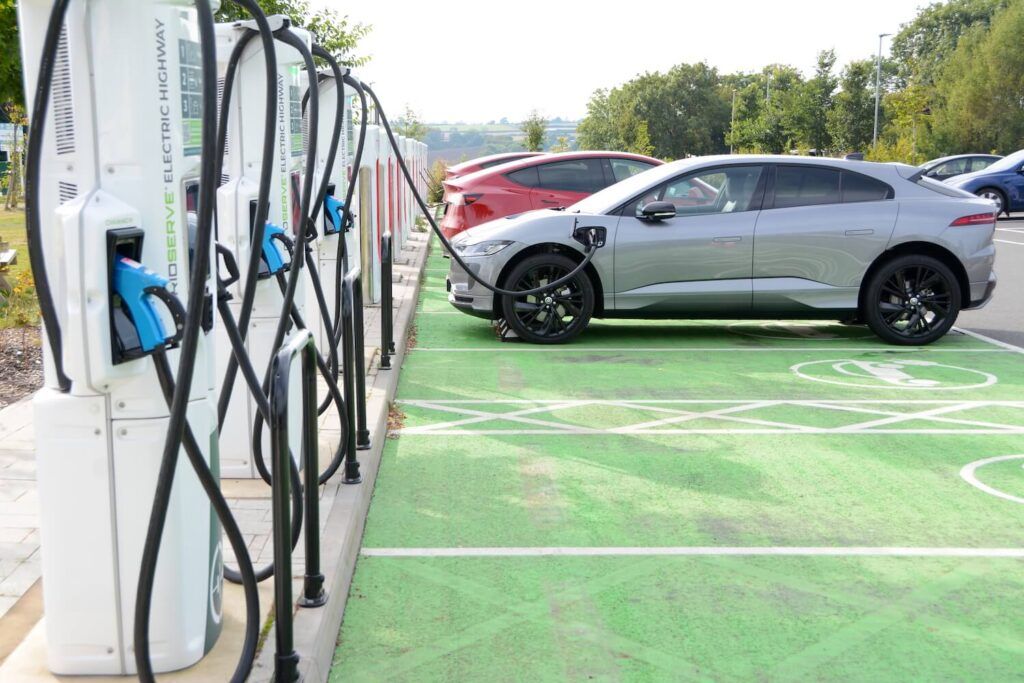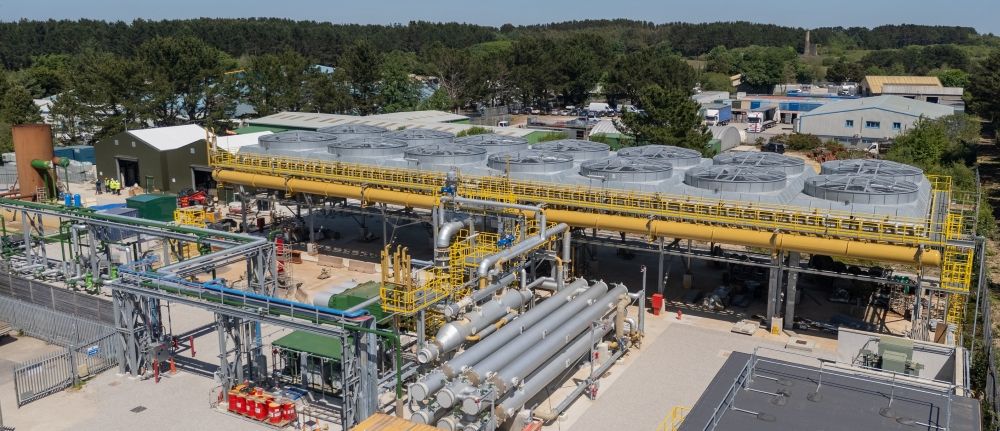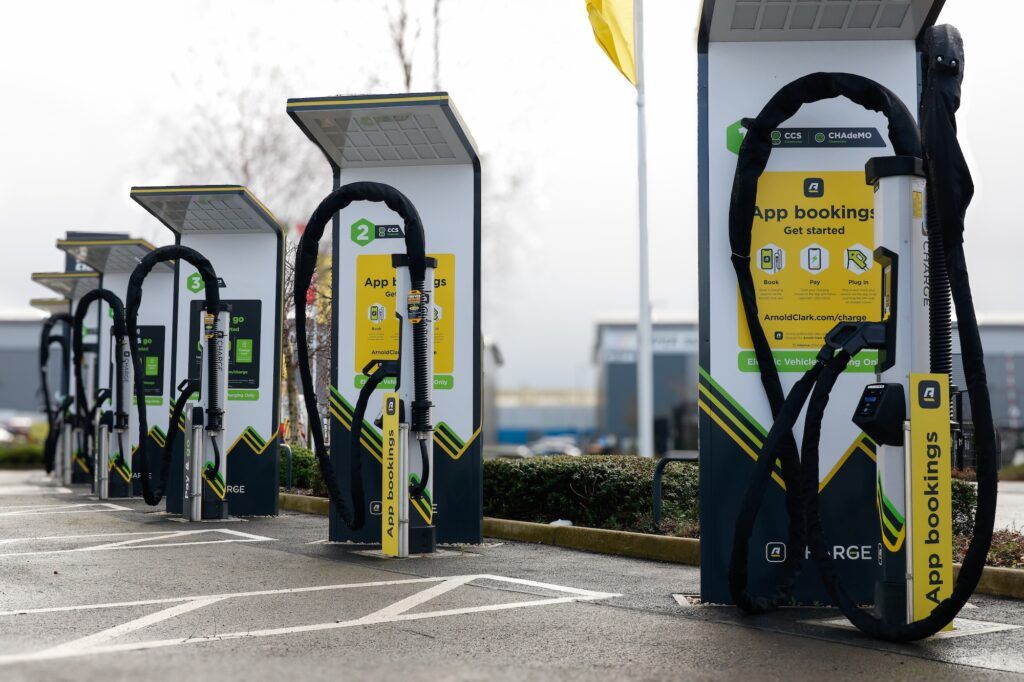Further detail on clean energy and the role of zero emission vehicles has been outlined in the UK Government’s updated Carbon Budget and Growth Delivery Plan.
The framework includes plans on Sustainable Aviation Fuel, access to electric vehicle charging infrastructure and investment in clean energy to meet its targets for 2035. Originally aiming to reduce emissions by 78% against the 1990 base level, it is now targeting an 81% cut in the next decade.
The core of the government’s plans include investment in clean domestically-produced power, a national plan to deliver 400,000 extra green sector jobs, its Warm Homes agenda, including solar power, and delivery of cleaner air – including promotion of zero emission vehicles.
The report highlights the Electric Car Grant, announced this summer, but goes further and adds that it will consult on “empowering” renters and leaseholders to install home chargepoints. This includes the announcement this week on cutting red tape on cross-pavement charging solutions.
In addition, it added that “Ofgem will also ensure that Distribution Network Operators offer quality connection and smooth
and rapid connections to all customers, including chargepoint operators. These measures will help drive the transition to zero emission vehicles and ensure everyone can share the benefits’.
The plan made three key points:
- A “further 100,000” chargepoints expected to be installed as a result of the Local EV Infrastructure Fund and £6 billion of private investment committed to 2030 – alongside the £25 million scheme for local authorities to expand access to cheaper at-home charging.
- A zero-emission fleet of vans and heavy goods vehicles will be at the “core of a cleaner and more efficient freight and logistics sector”.
- Decarbonising aviation, with the SAF Mandate requiring 22% of UK jet fuel to be sustainable aviation fuel by 2040. We are also taking steps to power ships with sustainable fuels and electricity.
Secretary of State, Ed Miliband, said:
Over the last 16 months we have put clean energy and climate action at the heart of our government’s agenda – because we know it is the route to making the British people better off.
This is about delivering better lives for people today – from warmer homes and cleaner air to cheaper transport and increased access to nature – as we tackle the climate and nature crises to protect our home for future generations.
It would be negligent to leave our children and grandchildren to face energy insecurity and climate breakdown. By providing clarity and certainty on how Britain will seize these opportunities, this plan will help unlock the investment we need in clean energy, jobs and growth at home. And it will strengthen our position as a climate leader so we can push others internationally to take the action needed to avoid disaster.
Minister for Climate, Katie White, said:
“Our world leading Carbon Budget and Growth Delivery Plan supports good jobs now and in the future, while continuing to attract billions of pounds of investment into Britain. Today’s plan reaffirms that clean energy is the economic opportunity of the 21st century.”
Nigel Topping CMG, Chair of the Climate Change Committee, said:
“It’s good to see the first comprehensive plan from the current Government for achieving the next carbon budgets. We will assess it fully in our annual progress report in June next year.
“There have been some encouraging signs of progress in the delivery indicators in our recent progress report. However, a significant increase in roll-out rates is needed in many areas in the next few years. It’s essential that progress against these is monitored with plans adjusted accordingly if things go off track.
“Our number one recommendation remains to make electricity cheaper. This means taking policy costs off electricity bills. This is vital for ensuring the required scale-up of heat pump installations in the plan and we hope to see this addressed in the upcoming Warm Homes Plan.”
Colin Walker, Head of Transport, at the Energy and Climate Intelligence Unit (ECIU) said:
‘The problem isn’t those who fly to go on their annual holidays, but there’s certainly a fairness point here given 30% of flights are taken by just 3%.
“The Government is pinning its hopes for cutting aviation emissions on Sustainable Aviation Fuels and technological innovations that are still very much in their infancy, and failing to encourage ultra-frequent flyers from making more sustainable choices.”
Rain Newton Smith, CEO of the Confederation of British Industry, said:
“Clear, consistent climate laws have helped make the UK a global leader in clean energy investment and innovation. This transition is not only essential for tackling climate change – it’s a strategic economic opportunity. Businesses remain committed because they understand this transition is the backbone of a competitive, resilient economy in an uncertain world. The science hasn’t changed but the risks of inaction have.”
Shirine Khoury-Haq, The Co-operative Group Chief Executive and co-chair of the Net Zero Council said:
“Building on the significant progress that the UK continues to make in reducing its emissions, today’s announcement is another important step. It’s vital we continue to act to tackle climate change, to deliver a fairer future for generations to come.”
Paul Nowak, General Secretary of the TUC, said:
“This climate plan includes vital commitments to invest into manufacturing supply chains and good jobs. That’s welcome news for workers in every corner of the country.”
Friends of the Earth’s Chief Executive, Asad Rehman, said:
“There are some encouraging signs that, at long last, we have a government ready to step up and get the UK’s climate targets back on track. But we won’t know for sure until we have studied the full detail of the plan.”
Andy Prendergast, GMB National Secretary, said:
“Delivering good jobs must be the number one mission of all governments. If this plan delivers good, secure jobs and tackles climate change, it can only be a good thing.”
Rachel Solomon Williams, Executive Director of the Aldersgate Group, said:
“Economic growth must be based on decarbonisation, especially given the material risk that climate change poses to businesses and the opportunities offered by the global transition. The Climate Change Act, and the delivery plans that it requires, helps the UK to maintain its leadership position. It also offers certainty and attracts global investment to futureproof the UK economy.”
Sarah Boon, Managing Director, Corporate Affairs & Strategic Policy at UK Finance, said:
“The UK’s transition to a low‑carbon economy is a huge opportunity to drive investment, create jobs, and secure long-term growth. Our industry is ready to play its part through lending and financing.”
Rachael Orr, CEO of Climate Outreach said:
“This plan is right to highlight the benefits the clean energy transition can bring to people across the country. Almost three quarters of us are worried about climate change and there is a quiet sense of pride across the country that we are building the clean industries of the future. Many people feel genuine excitement about climate policy when it’s seen as an investment in something tangible which benefits their homes, communities and our natural world.”
Miles Celic OBE, CEO of TheCityUK, said:
“The publication of the Carbon Budget Delivery and Growth Plan (CBDGP), and the inclusion of the Investor Prospectus particularly, marks a positive step forward in providing industry with clarity on the UK’s net zero policy landscape and the government support available.”
Minnie Moll, CEO of the Design Council, said:
“We fully support the government’s stance that green growth and economic growth go hand in hand and are delighted that design has been recognised as a key clean energy job, a vital acknowledgment of the sector’s role in driving innovation for the green economy. This recognition aligns with our mission to upskill one million designers in green design skills by 2030, ensuring the UK design industry leads the way in the green transition.”
Ian Simm, CEO of Impax Asset Management said:
“By prioritising practical benefits – lower bills, good jobs, warmer homes and cleaner air – it makes a compelling case for accelerated climate action underpinning much-needed economic growth. I applaud the Secretary of State for outlining a clear path forward and look forward to continuing our work through the Net Zero Council to help unlock the investment needed to deliver it.”
Beverley Cornaby, Director, UK Corporate Leaders Group, said:
“Business leaders across the UK know that delivering on our climate goals is also an opportunity to drive innovation, unlock investment, and build resilience in the face of volatile global energy prices. It simply makes good business sense.”
Chris Cummings, Chief Executive of the Investment Association, said:
“This is an important step in establishing dialogue between potential investors and government to build confidence on policy direction, involve investors at an early stage in project development, and build capacity in government to engage constructively with investors at every stage of the capital cycle from start-up to major infrastructure project.”
Matthew Evans, COO and Director of Markets at techUK, said:
“The new plan shows climate action is good for growth and great for businesses. With digital solutions integral to delivering progress, jobs, and with the potential to cut global emissions by 20%, techUK is looking forward to working with government to achieve this ambitious plan.”












